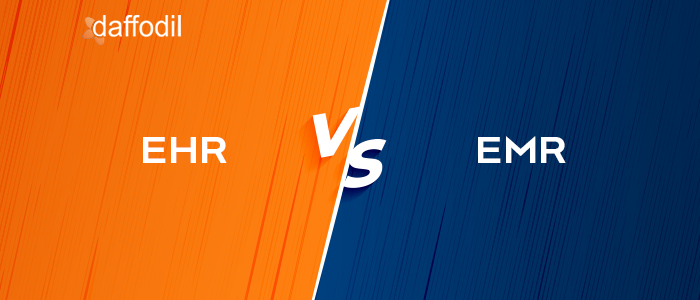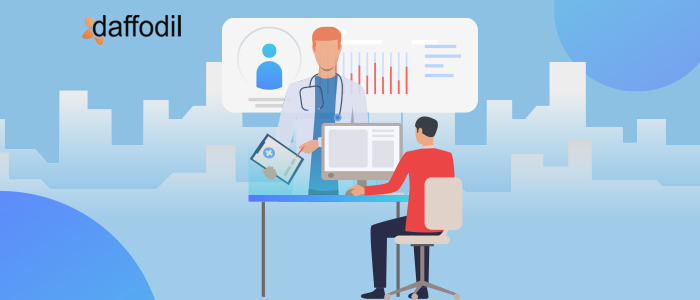Trusted by:
6 business-centric outcomes of our custom EHR software
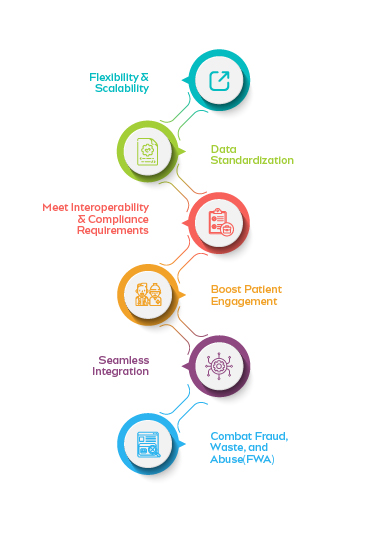
A comprehensive solution that goes above and beyond the elementary features.
Navigating the complex landscape of regulatory compliance is challenging, given the unique requirements of each region. Our comprehensive solution is designed to seamlessly address a wide array of standards, including those specific to the United States (HIPAA, CMS), Europe (GDPR, NHS), and Southeast Asia (MOH). Adhering to these regulations effectively and promptly is essential to avoid hefty financial penalties.
Offer a comprehensive digital front door to your patients where they have secure access to their health data, personalized care plans, AI-enabled remote monitoring & telehealth, appointment scheduling & reminders, emergency service integration, caregiver access, wearable integration, health education resources, etc. This leads to improved patient engagement, efficient care coordination, personalized healthcare experience, and centralized health information access.
Build inter-department efficiency across your healthcare organization through facilitating seamless information sharing of OPD, IPD, appointments, bed availability, pharmacy supply inventory, equipment and resource availability, near real-time health alerts, advanced reporting, and user access control. This aids in better staff utilization, improves care coordination, reduces redundant processes, and saves costs.
Efficiently manage healthcare data with a unified FHIR endpoint, transforming it into a versatile omnichannel data platform. By normalizing diverse data into a cohesive FHIR structure, break down knowledge silos and construct a centralized data repository. Enhance this approach by integrating a robust data lake, capturing both structured and unstructured healthcare data for performing comprehensive analytics. Data lake enables advanced processing, facilitating data mining, trend analysis, and predictive modeling using AI algorithms. This empowers healthcare providers with valuable insights, contributing to overall operational efficiency.
Get a 360° view of the patient’s historical clinical data in an organized format. Aggregated data from diverse sources for optimized patient profiling including demographics, lab results, imaging studies, previous diagnostic data, medication history, allergies, etc. It helps in overcoming care gaps improves provider productivity, and reduces risk stratification. It offers customizable dashboards along with near real-time updates, reducing the turnaround time for critical care providers.
Leverage the power of AI in different aspects of your system and boost efficiency. Integrate and implement functionalities such as AI-enabled provider transcripts, ML algorithm-powered symptom checker, sentiment analysis, anomaly detection for early intervention, recognizing prescribing behavioral patterns, predictive analytics for better resource utilization, NLP-based clinical notes interpretation, and automatically suggesting appropriate billing codes, etc. to help combat Fraud, Waste, and Abuse. Also, incorporate AI-driven clinical recommendations in telehealth services for better decision-making.
Current landscape of EHR software adoption
The landscape of electronic health records (EHR) is evolving at a brisk pace, with the global EHR solution market projected to expand at a compound annual growth rate (CAGR) of 9.3%, reaching a valuation of USD 52.98 billion by 2027. This growth is indicative of the increasing reliance on digital solutions within the healthcare sector to manage patient information. Despite the promise of streamlined patient care and improved health outcomes, healthcare providers continue to grapple with a multitude of challenges inherent in the current EHR systems.
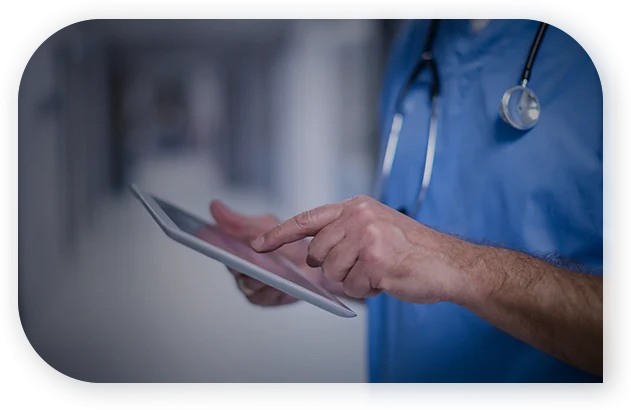
Critical issues driving the need for EHR software
Healthcare information resides in a fragmented landscape of data repositories creating knowledge silos, blocking access to data, services, and coherent insights across an organization.
The disparate data sources, inefficiencies of legacy systems, and clinical nuances makes it difficult for providers to aggregate data in standardized formats.
The inefficient operational redundancies coupled with the fragmented nature of healthcare, documentation burden, and resource constraints create bottlenecks in patient care & administrative processes.
Different IDNs/ACOs use different source systems, often lacking standardization. Hence, making them incompatible for seamless HIE.
Meeting regulatory requirements of ONC/CMS and being compliant with HIPAA, GDPR, etc. with frequent timely updates is not only crucial but also complex. It can even lead to penalties for missing timelines.
The sheer volume, complexity, and unstructured formats of healthcare data generated via legacy systems make data migration/management a hefty expense. It often leads to unplanned system downtime disrupting life-saving healthcare operations.
Customer success stories
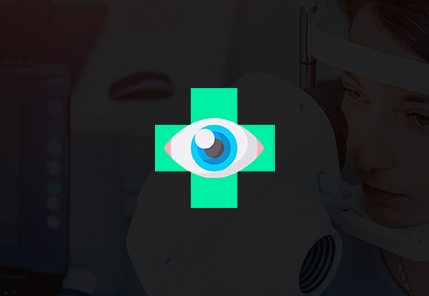
Developing a comprehensive EHR system for the largest eye care group in the United States
Read More >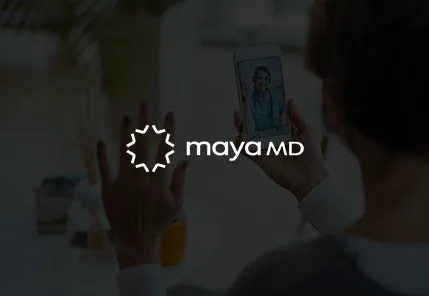
Developing an AI-powered telehealth application for a US-based health tech firm
Read More >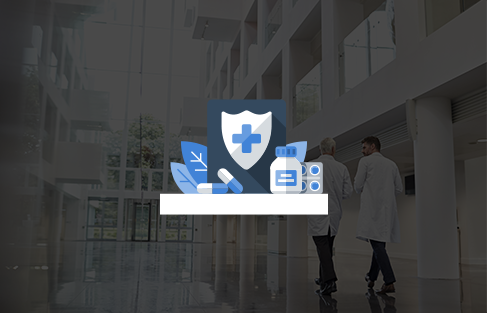
New York’s leading hospital reduces door to balloon time for STEMI patients through an emergency response app
Read More >A solution tailored to satisfy every stakeholder's needs
Why Daffodil Software
Recognized excellence, proven customer satisfaction
Categorized as an aspirant in global PEAK Matrix assessment
Recommended vendor for custom software development services
Mentioned as a company to watch in the AI space
Categorized as a leader in digital engineering services
20+
years of software engineering excellence
150+
global clientele
4.8
Avg CSAT score
95%
customer retention rate
We create agile and adaptable healthcare applications to help you improve patient outcomes.
Watch our brand video.
Need to discuss your EHR software development requirements?
Sign up for a 30 min no-obligation
strategic session with us
- Validation of your project idea/ scope of your project
- Actionable insights on which technology would suit your requirements
- Industry specific best practices that can be applied to your project
- Implementation and engagement plan of action
- Ballpark estimate and time-frame for development
Frequently Asked Questions
Choosing between a custom EHR system and an off-the-shelf solution depends on your healthcare practice’s specific needs, size, budget, and workflow. Custom EHR software is made to order, fitting your practice’s unique requirements, and can be scaled up as your practice grows. You pay for only what you need, potentially saving money by avoiding unnecessary features.
Our modules are designed to integrate smoothly with your current systems, ensuring easy interoperability and minimal disruption to daily operations. Our solutions are flexible and can grow with your practice, whether you’re looking to improve certain areas of practice management or expand your EHR system over time.
Our custom EHRs also offer the additional benefit of incorporating functionalities like patient portals or telehealth services, leading to more efficient operations and centralized patient information.
Off-the-shelf EHR software is ready-made and usually less expensive upfront. It comes with a wide range of features to meet the needs of many practices, but it might include more than what you need. You may also need to adjust your practice’s workflow to fit the software, which can be a downside.
In summary, if you want a system that fits your practice well and can adapt to growth, a custom EHR is a good choice. If you’re looking for a quick, less costly solution, then an off-the-shelf EHR might work for you. The best option depends on what suits your practice and your patients best.
We recognize that every healthcare organization has unique needs and may not require a comprehensive solution. That’s why we offer the flexibility to choose standalone modules, such as a Hospital Information Management System (HIMS) or a patient portal, tailored to your specific requirements. This modular approach ensures that you can select the components that are most relevant to your practice, allowing for a customized EHR solution that aligns with your workflow and enhances your operational efficiency.
Our standalone modules are designed to be seamlessly integrated with your existing systems, ensuring smooth interoperability and minimizing disruptions to your daily operations. Whether you’re looking to upgrade specific aspects of your practice management or you’re in the process of gradually building a more robust EHR system, our solutions are scalable and adaptable.
Furthermore, opting for individual modules can be a cost-effective strategy for healthcare providers who are not ready to invest in a full suite. It allows for the strategic allocation of resources to areas with the most immediate need or greatest potential for return on investment.
By providing this level of customization, we empower healthcare organizations to evolve at their own pace, expanding their EHR capabilities as their budget, size, and complexity grow. Our goal is to support you in delivering the best patient care possible with technology solutions that are as versatile and dynamic as the healthcare industry itself.
The total cost of ownership for custom Electronic Health Records (EHR) software is highly variable and depends on your specific requirements. Initial development costs are influenced by the desired features, level of customization, and the scale of your practice. Implementation expenses include data migration, staff training, and initial support, which vary based on the complexity of your existing systems and processes. Ongoing maintenance costs for updates and upgrades will also contribute to the TCO and depend on the evolving needs of your practice.
Given the customized nature of EHR systems, it’s difficult to provide a precise cost without a detailed assessment of your needs. A detailed consultation is necessary to determine a more accurate cost estimate tailored to your organization.
Our custom EHR software, meticulously crafted by healthcare software architects, is designed to master the complexities of integration with pre-existing integrated EHR software systems, ensuring data consistency and a superior user experience. This solution conforms to critical healthcare data exchange protocols such as HIPAA, GDPR, HL7, FHIR, etc. enabling them to become a pivotal component in the accurate and efficient sharing of medical information. They provide tailored data mapping for a flawless transition of data, addressing one of the major concerns that EHR integration companies deal with when unifying disparate systems. The strategic use of APIs is a testament to their commitment to real-time data exchange, which is essential for EHR integration with other software products, reducing errors, and enhancing the connectivity between diverse healthcare applications. The user-centric design, a hallmark of custom EHR development, incorporates insights from medical practitioners to deliver an interface that simplifies user interaction and optimizes workflow. Furthermore, these solutions are equipped with powerful data migration tools to facilitate the secure transfer of patient records, an aspect that EHR integration companies prioritize to prevent data loss. To complement these technical capabilities, providers of custom EHR solutions offer comprehensive support and training, ensuring that the healthcare staff can navigate any integration-related challenges with ease, thus upholding user confidence and propelling the advancement of healthcare service delivery.
EHR software elevates healthcare efficiency by centralizing patient data, automating administrative tasks, and enhancing care coordination leading to quicker access to records and overcoming patient care gaps. The system’s versatility and scalability extend from patient engagement to broad HMIS and EHR/EMR capabilities, streamlining operations and reducing the total cost of ownership while preparing for future healthcare advancements. With data standardized into a uniform FHIR format, EHRs facilitate comprehensive analytics and actionable insights. It breaks down data silos, ensuring interoperability and compliance with ONC/CMS standards pivotal for value-based care. AI-based features tools within EHR software not only heightens patient engagement but also integrate seamlessly with existing systems, avoiding costly new implementations. Additionally, our EHR software solution employ AI to enhance fraud, waste, and abuse management by detecting anomalies in prescribing patterns, enabling audits, and issuing alerts, which in turn minimize costs and address healthcare inefficiencies.
























